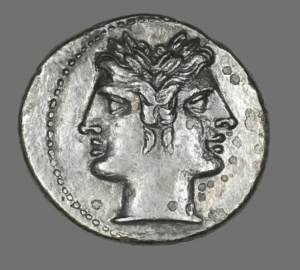
Tomorrow, January 4, is New Year’s Day, too… and so are January 5th and 6th and 7th… and even March 25th, for that matter. In fact, did you know that in America, for over a century, March 25 actually was New Year’s Day. More about that in a minute.
Dating of the beginning of the New Year is completely arbitrary. The length of the year is fixed by nature – as is the length of the day – but nothing in the natural order requires the beginning of the year to be fixed on a particular day.
What is not fixed by nature – is completely arbitrary – are also the number of months and weeks *, the number of days in the weeks, the number of hours in the day, as well as the number of minutes in an hour. How would you like ten months of 36 days, with a few months of 37 to make it come out right? Or twenty hours in the day, each divided into.. oh, never mind. I’m sorry I got into the details. But you take the point.
- We got our seven day week from the ancient Babylonians, plotted on the lunar cycle. As for our months of thirty days (more or less), we’ll come to that.
A much more than adequate History of New Year’s Days, just to emphasize the point

The Chinese New Year functions according to the phases of the moon, but it’s adjusted so that each year it falls between January 21 and February 20. This year the Chinese New Year will be Wednesday January 29.
In ancient Egypt, the new year began with the rising of Sirius, the brightest star, which occurred around mid-July, coinciding with the Nile’s annual flooding which began their agricultural season. After five days of celebration, the new calendar began, starting with the first of twelve months, each of which lasted thirty days. Apparently that was the source of our calendar with twelve months.
The Jewish New Year (Rosh Hashanah) occurs 163 days after the first day of Passover, and thus is usually (but not always) determined by the new moon closest to the autumnal equinox. In terms of the Gregorian calendar, this usually falls in mid-September.
The Islamic New Year is based on the solar calendar, which means that (according to our Gregorian calendar) the date moves eleven days ahead each year. Muslim New Year’s Day in 2025 will fall on Friday June 27.

In ancient times in Rome, the calendar was a mess. So in the year 46 BC, Julius Caesar established a new calendar which was almost (though not quite) in sync with the sun. (Today it is about twelve days off.) His “Julian Calendar” placed New Year’s Day on January 1, which he thought appropriate to honor Janus the two faced god, looking both backward and forward, whose festival fell on that day. (We will obviously come back to this.)
Somewhere in here we shold talk about our Orthodox Ecclesiastical New Year which begins on September 1. This was apparently established by the Emperor Constantine for political reasons: 1) It was called the “Indiction”, the day taxes were collected – rather like our American April 15 – probably explaining why it was never much celebrated, even in the Church. 2) It was also remembered as the day Christ began His public ministry at the synagogue in Nazareth. He read a Messianic prophecy from the book of the Isaiah and then, to everyone’s shock, concluded “Today these things have been fulfilled in your presence.” Luke 4
However, after the fall of the Roman Empire, Christians in Western Europe progressively came to fix the beginning of the New Year on March 25. Surely you can figure out why. England adopted this date in the Twelfth Century. This meant that British colonies, such as the United States and Canada, kept New Year’s Day on March 25.
Meanwhile in 1582 Pope Gregory XIII of Rome introduced a much more accurate Gregorian Calendar which restored New Year’s Day to January 1. Protestants resisted this, because in those days they resisted anything that was Roman Catholic. However in time they came to see the wisdom of the accurate calendar. In 1752 the British Empire shifted to the Gregorian calendar. And that explains why we in the United States just celebrated the New Year of 2025 on January 1.
Since then the whole world with has gone to the Gregorian calendar, with one exception: the majority of Eastern Orthodox. (Who ever would have guessed?)
Today almost the whole world, from the United States to Great Britain to Syria to China and North Korea! – no matter their traditional cultural New Year – now also celebrates New Year’s Day with us on January 1. See for yourself:
I am now going to quote myself from a Blog Post of long ago. I looked back at it, and for once I couldn’t think of a better way to say it:
“No matter how people now describe the years, Anno Domini – or Christian Era or Common Era or whatever else they come up with next to avoid the obvious – the fact is that they all are measured from the birth of Jesus Christ. Even the modern secularists can’t get away from Him.
“The even more important truth is this: Every day we begin a new year. Every day we start all over again with a new chance for each of us. Every day is a fresh gift of God. Every morning is God’s new creation, a fresh new morning, a new beginning for each of us.
So Happy New Year to you! – today and tomorrow and every day.”
______________________________
The black space below (on my computer at least) contains the song “Morning has broken, like the first morning…”, which was popular in the early 1970s (#1 on at least one chart) – sung here by Cat Stevens, an interesting young man who finally became a devout Muslim. The words were written by Eleanor Farjeon, noted author and member of the Church of England, set to a traditional Scottish/Gaelic melody. It makes the point better than all my words above.
Here are the words, but I hope you’ll watch the video, which is lovely.
Morning has broken like the first morning. Blackbird has spoken like the first bird. Praise for the singing, praise for the morning. Praise for them springing fresh from the Word.
Sweet the rains new fall, sunlit from Heaven, Like the first dewfall on the first grass. Praise for the sweetness of the wet garden, Sprung in completeness where His feet pass.
Mine is the sunlight, mine is the morning, Born of the one light Eden saw play. Praise with elation, praise every morning, God’s re-creation of the new day.
Morning has broken like the first morning. Blackbird has spoken like the first bird. Praise for the singing, praise for the morning. Praise for them springing fresh from the Word.
To open it bekiwm just press the words “Open on YouTube”.
Next Week: Water
Week after Next: Saint Makarios of Egypt